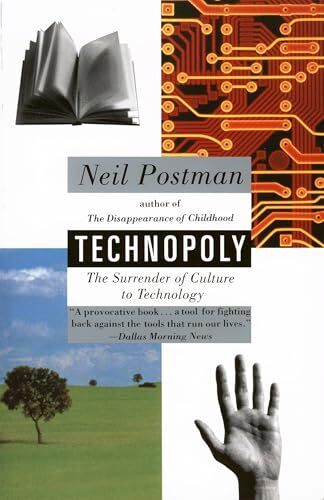
I found Amusing Ourselves to Death to be deeply insightful and profound. Technopoly, much less so. There are a few great ideas in this book, as Postman is a strong thinker and clear writer, but it didn’t come together for me as a whole.
The core argument is that society has evolved from a tool-using culture, where technologies are mainly used to solve physical problems, to a technocracy, where technology and invention become more of a central focus and begins to displace social and religious traditions, and finally, to a technopoly, where all forms of cultural life are subservient to technology and science. And while Postman recognizes that technology and science bring many benefits, he also recognizes the drawbacks.
One drawback is that technology doesn’t just add to society, it transforms and replaces it: it’s not Europe before the printing press and then Europe plus the printing press, it’s a totally different Europe after the printing press. Technology transforms culture, society, language, thought, and so much more. And that means that we lose some of the things from the past that were quite valuable.
Another drawback is that once you’re living in a technopoly, people begin to believe that only technology and science can provide valid answers: any human subjectivity is bad, and only measurement, numbers, and scientific research are good. And that’s a problem because there are areas of life where technology and science cannot, and should not, try to provide answers, such as morals and ethics. And yet we now discount all the traditional ways of addressing those questions, such as religion, tradition, fictional works, impassioned debate, etc.
I think there is a lot of truth to that central argument: there is no doubt that all technology is a double-edged sword, and while the benefits have been massive, we have definitely lost something as a society, and in some ways, are worse off. But Postman’s alternatives or solutions don’t sound very compelling. He tries to discuss some possibilities in the final chapter, but frankly, they aren’t very convincing. The old ways—the old traditions, religion, etc.—aren’t always better either. They too are double-edged swords, just like technology. In fact, most of what we consider old now was new technology at some point.
I think what matters in modern society is that we create thinking, questioning, aware individuals who can analyze their options and pick the solutions that work best. In older societies, tradition and religion would squash all. In fact, a hallmark of religion is to “have faith” and ignore all evidence to the contrary; and a hallmark of class based society was that everyone was born into their place and you shouldn’t try to go above your station. Society moving away from these sorts of things is a good thing. Science and technology are not without drawbacks, but all options for society have drawbacks: there’s no silver bullet, no perfect solution. It’s a question of trade-offs, and picking the option with the benefits that matter to you the most, and the drawbacks that you can live with. And I think science and technology give us the best set of trade-offs we’ve discovered so far.
